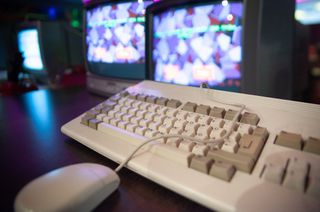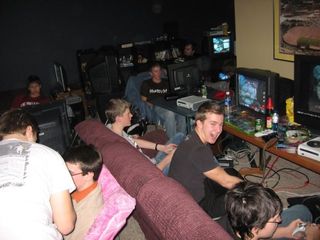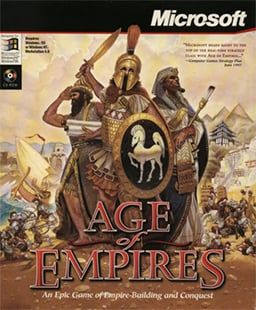Remember when playing multiplayer games meant setting up a LAN party?

I love playing online multiplayer games with my buddies each night after a long day of work. While it's nice that we can easily jump on our own gaming platforms and make this happen from our own homes (especially during this pandemic), I really miss the days when in-person LAN parties were more of a thing. For me, physically getting together to play our video games is far more enjoyable than just simply playing online. I guess that's why I look back on my '90s through early 2000's LAN parties with such fondness.
I grew up in a very different household from many other '90s kids out there. My dad is an electrical engineer nerd who loves gaming and technology of any kind. Every Saturday he would flit from garage sale to garage sale buying computer components and "broken" computers for cheap from folks who were much less tech-savvy than he was. He would then build new computers out of these parts or would take the time to fix any issues preventing these devices from working properly. He'd often give away his projects after completing them, but he also held on to several of them.

As a result of my dad's hobby, we had multiple computers in our home. Four working computers in the den, one upstairs, two additional computers in the living room, and several unplugged computers that my dad couldn't find a place to set up (he's a bit of a packrat, bless his heart).
Seven functional computers in a house are way more than normal even by today's standards, but back then, this was unheard of. In case you didn't live back in the 1990s through early 2000s or need a refresher, computers were incredibly expensive and daunting for most people back then. They were relatively new for most adults who didn't know how to troubleshoot effectively through problems. On top of that, the internet wasn't nearly as helpful with these kinds of issues as it is today.

From a practical standpoint, having all these computers made it so that my five siblings and I could each write up our homework assignments without needing to take turns on one computer or having to take trips to the library. But most importantly to our child minds, it allowed us to play video games together on the same network. Just imagine a group of middle school and high school kids, each of them seated at a boxy, off-white '90s computer with their right hands on wired computer mouse with a rubber ball inside — you get the picture.

I remember when my older brother discovered Age of Empires. It was one of the first games to change our summer vacations. We'd carefully pass the CD around to load the game up on the various computers and then we'd compete against each other to see who could create the most powerful civilization. Some of our other favorites included Laser Arena, Star Wars Jedi Knight: Jedi Academy, and Worms. One day I was telling my friends about these multiplayer video game sessions and was shocked to realize that not everyone had such easy access to a computer and had never even taken part in a LAN party. After that, I started inviting my friends over and we'd all play together.
The best part was that we didn't need an internet connection to do this. As long as we had the necessary cables and routers (which my dad did), we could connect on the local network. We were able to laugh and joke around while in the same room, sneak peeks at each other's screens, and take snack or drink breaks together. It was just a really fun social experience.
Master your iPhone in minutes
iMore offers spot-on advice and guidance from our team of experts, with decades of Apple device experience to lean on. Learn more with iMore!
In my opinion, playing in separate locations isn't nearly as fun as enjoying the experience from the same room.
I even held LAN parties in my apartment at college. Friends would bring their laptops to my crappy apartment and we'd all connect to play Hedgewars or one of the other popular games at the time. Much like myself, many of my friends in college were introverts, and having a party where our attention was first focused on video games instead of ourselves allowed us to relax and get to know each other better.
After we grew tired of playing, we'd sit back on the couches and talk far into the night while eating the cheap snacks I'd purchased with my limited college student money. These LAN parties were times for bonding and discussion among my friends.
Flash forward to today. If I want to play Fortnite, Anthem, or Apex Legends with my friends, we just hop online and play in our own homes. This definitely has its own set of perks, like not having to lug our gear around. Plus, it makes it so we don't cut into our limited free time traveling to and from a friend's house just to play for a couple of hours. However, in my opinion, playing in separate locations isn't nearly as fun as enjoying the experience in the same room.
Plus, if you're still feeling social after deciding to end the gaming session, it isn't as easy to continue to hang out together if you've been playing online. LAN parties helped with adding an additional amount of social interaction to multiplayer gaming. While online multiplayers have made things more convenient for us, they've also made these gaming sessions a little less social.
Damn, I miss LAN parties.
More navigation links:
Techno-stalgia
iMore
- My First Mac
- Remembering arcades
- Love for LAN
- Lemonade Stand memories
- The classy iPod Classic
- Game manual memorabilia
- Nintendo Nostalgia
- Cassettes vs digital music
Android Central
- The best Android tablet was the Pixel C
- Galaxy S Fascinate retrospective review
- HTC Inspire 4G retrospective review
- Why the Moto X was the best
- Honeycomb: The Android version we all forgot
- Nexus Q was super weird but influential
- NVIDIA Shield is timeless
- The first Android phones I loved
- Android 10 vs. Android 4.4
- Android phones with physical keyboards
- Admit it, Android sucked before 2017
- The wild early days of Android smartwatches
Windows Central

Gaming aficionado Rebecca Spear is iMore's dedicated gaming editor with a focus on Nintendo Switch and iOS gaming. You’ll never catch her without her Switch or her iPad Air handy. If you’ve got a question about Pokémon, The Legend of Zelda, or just about any other Nintendo series check out her guides to help you out. Rebecca has written thousands of articles in the last six years including hundreds of extensive gaming guides, previews, and reviews for both Switch and Apple Arcade. She also loves checking out new gaming accessories like iPhone controllers and has her ear to the ground when it comes to covering the next big trend.
Most Popular




